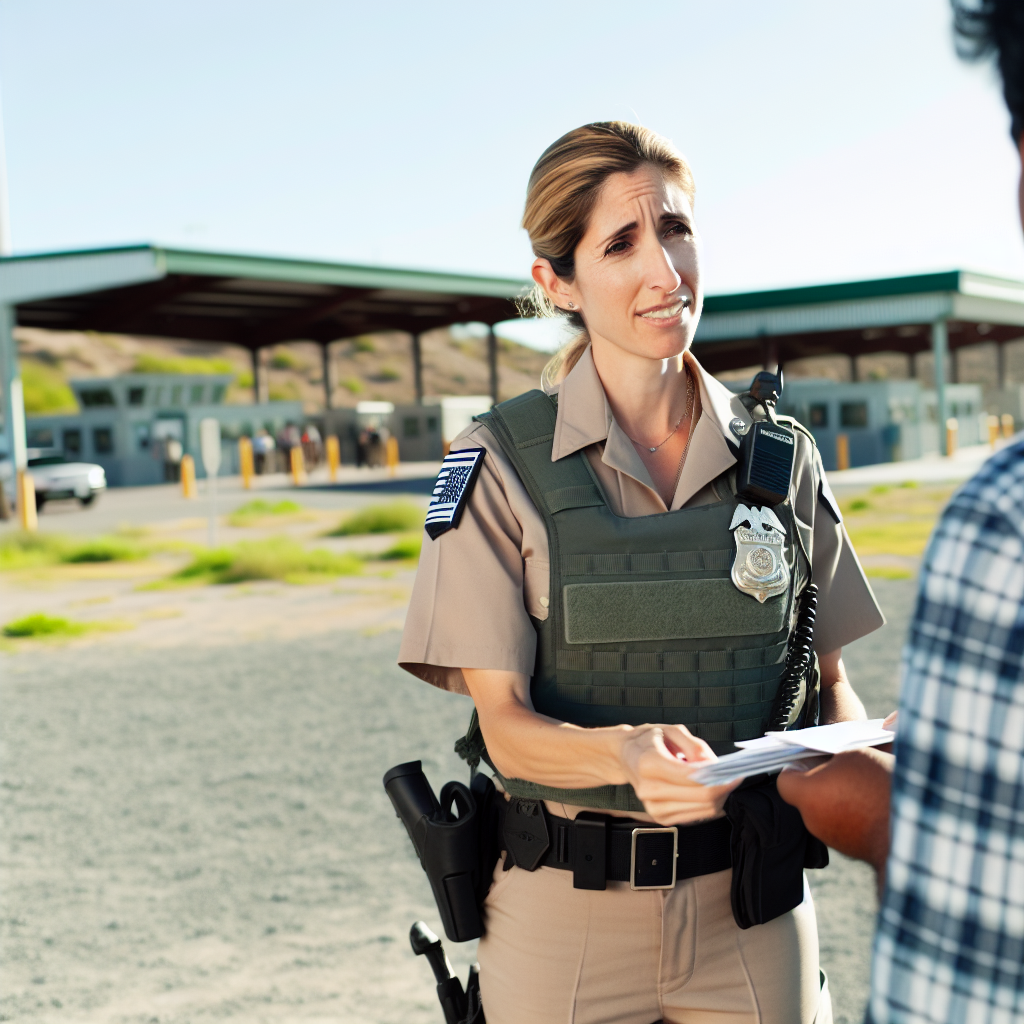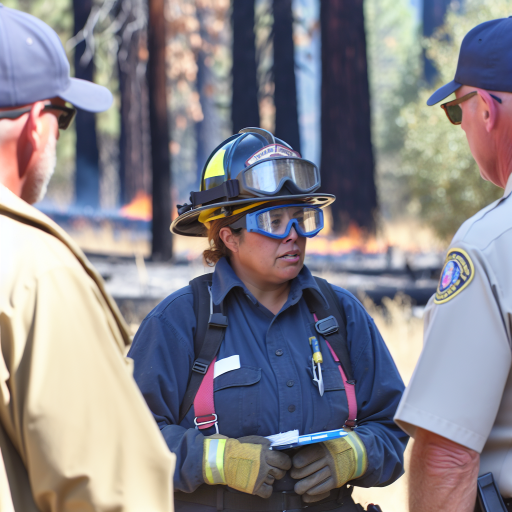Introduction:
CBP officers play a crucial role in ensuring border security.
The work environment and conditions for CBP officers are vital for their effectiveness.
Work Environment:
CBP officers operate in various settings like airports, seaports, and land borders.
They work in high-pressure environments that require constant vigilance.
Interaction with diverse individuals and potential threats is a daily occurrence.
The work environment often involves long hours and rotating shifts.
Conditions:
CBP officers face physical demands such as standing for extended periods.
They must endure varying weather conditions and exposure to hazardous materials.
Regular training and re-certification are necessary to ensure readiness.
CBP officers must adhere to strict protocols and guidelines to maintain safety.
Impact:
A conducive work environment enhances CBP officers’ performance and morale.
Positive conditions contribute to effective border security and threat prevention.
Supportive conditions can reduce stress and burnout among CBP officers.
The work environment and conditions significantly impact CBP officers’ effectiveness.
Physical Environment
CBP officers are exposed to extreme weather conditions such as scorching heat or freezing cold.
The physical demands of patrolling the border involve long hours of walking, climbing, and standing.
Safety concerns related to the terrain include rough, uneven surfaces that may lead to slips or falls.
Workplace Safety
CBP officers are provided with proper training and equipment to handle potential safety hazards.
Regular safety inspections are conducted to ensure a safe work environment for officers.
Emergency protocols are in place to address any safety issues that may arise during duty.
Transform Your Career Today
Unlock a personalized career strategy that drives real results. Get tailored advice and a roadmap designed just for you.
Start NowHealth Concerns
The physically demanding nature of the job can lead to musculoskeletal injuries for CBP officers.
Exposure to pollutants or hazardous materials at border checkpoints may pose health risks.
Stress management programs are available to help officers cope with the mental and emotional challenges of the job.
Work-Life Balance
CBP officers often work long hours, including weekends and holidays, which can impact their personal life.
Adequate rest periods and breaks are essential to prevent burnout and ensure mental wellness.
Support systems such as counseling services and peer support groups are provided to address work-life balance issues.
Equipment and Resources
CBP officers are equipped with tools such as firearms, radios, and protective gear to perform their duties.
Adequate training is provided on how to use and maintain equipment properly to ensure officer safety.
Access to resources such as surveillance technology and vehicles enhances the effectiveness of border patrol operations.
Collaboration and Communication
CBP officers work closely with other law enforcement agencies to ensure seamless coordination in border security.
Effective communication skills are essential for interacting with diverse populations at border crossings.
Information sharing and collaboration play a crucial role in preventing illegal activities and maintaining national security.
Job Stressors
Job stressors are significant challenges for CBP officers.
High-pressure situations arise when dealing with potential threats.
CBP officers often find themselves in high-pressure situations.
Quick decisions need to be made to ensure safety and security.
This pressure can create immense stress and anxiety.
The stakes are high, and the margin for error is slim.
There is also an emotional toll from witnessing illegal activities.
CBP officers regularly witness the harsh realities of criminal behavior.
Transform Your Career Today
Unlock a personalized career strategy that drives real results. Get tailored advice and a roadmap designed just for you.
Start NowActivities include catching human traffickers and drug smugglers.
This exposure contributes to their overall stress level.
Officers must balance enforcement with compassion.
They enforce the law while treating individuals with dignity and respect.
Finding the right balance can be challenging and stressful.
Job stressors can take a toll on their mental and emotional well-being.
Agencies should provide adequate support and resources.
This support helps officers cope with stressors effectively.
Maintaining their effectiveness and morale is essential.
Find Out More: Security Consultant Job Market Trends
Equipment and resources:
One of the crucial aspects of the work environment for CBP officers is the availability of necessary tools and technology.
CBP officers rely heavily on equipment and resources to carry out their duties effectively.
- Availability of necessary tools and technology:
- Training on how to properly use equipment:
- Budget constraints affecting resources:
CBP officers require tools such as firearms, handcuffs, body armor, and radios to perform their duties.
Additionally, they rely on technology such as x-ray machines, scanners, and computer systems to enhance border security.
It is imperative for CBP officers to receive proper training on how to correctly use the equipment and resources provided to them.
This training ensures that they can effectively carry out their duties while maintaining safety protocols.
One challenge that CBP officers face is budget constraints affecting the availability of resources.
Limited funding may impact the procurement of new equipment or the maintenance of existing resources, which can hinder their ability to perform their duties efficiently.
Having access to necessary tools and technology, receiving proper training on how to use equipment, and addressing budget constraints are vital aspects of the work environment for CBP officers.
These factors play a significant role in determining the effectiveness and efficiency of CBP officers in safeguarding the nation’s borders.
Transform Your Career Today
Unlock a personalized career strategy that drives real results. Get tailored advice and a roadmap designed just for you.
Start NowExplore Further: Campus Security Officer: Addressing Vandalism Issues
Shift schedules:
One of the key factors influencing work environment and conditions for CBP officers is the shift schedules they are assigned.
- Ranging shifts for 24/7 coverage
- Occasional impact on work-life balance and overall well-being
- Various strategies for coping with irregular schedules
CBP officers are required to work rotating shifts to ensure round-the-clock coverage at ports of entry and border crossings.
This means officers may have to work early mornings, late nights, weekends, and holidays.
Working rotating shifts can be challenging and have a significant impact on officers’ work-life balance and overall well-being.
Adapting to irregular schedules can disrupt sleep patterns, leading to fatigue and decreased productivity.
Impact on work-life balance and overall well-being:
CBP officers often struggle to find time for personal activities, family responsibilities, and social engagements due to their irregular work schedules.
This can lead to feelings of isolation, stress, and burnout.
Moreover, the constant change in shifts can make it difficult for officers to establish a routine and maintain a healthy lifestyle.
This can negatively affect their physical and mental health in the long run.
Strategies for coping with irregular schedules:
- Establishing a consistent sleep schedule
- Creating a calming bedtime routine
- Making time for regular exercise and healthy meals
- Engaging in stress-relief activities such as meditation or yoga
- Seeking support from friends, family, or mental health professionals
- Setting boundaries and learning to say no to extra shifts or overtime
By implementing these strategies, CBP officers can better cope with their irregular schedules and maintain their well-being.
It is essential for agencies to support officers in managing their work-life balance and provide resources for mental health and wellness.
Shift schedules play a crucial role in shaping the work environment and conditions for CBP officers.
It is important for officers to prioritize self-care and seek help when needed to ensure they can perform their duties effectively and stay healthy.
Explore Further: Navigating Wildland Firefighter Career Changes
Health and Wellness
Importance of Physical Fitness for Job Performance
Physical fitness is crucial for CBP officers as they need to be in top shape for their demanding duties.
This includes being able to handle physical tasks such as chasing suspects, carrying heavy items, and standing for long periods of time.
Maintaining good physical health also contributes to overall job performance by improving stamina, reducing the risk of injuries, and enhancing mental alertness.
Mental Health Resources Available for Officers
CBP recognizes the importance of mental health and provides various resources to support officers’ well-being.
This includes access to counseling services, stress management programs, and peer support groups.
Transform Your Career Today
Unlock a personalized career strategy that drives real results. Get tailored advice and a roadmap designed just for you.
Start NowThese resources help officers cope with the challenges of their job and seek help when needed.
Workplace Policies Promoting Healthy Living
CBP has implemented workplace policies that promote healthy living among officers.
This includes offering wellness programs, flexible work schedules, and ergonomic workstations.
These initiatives aim to create a supportive work environment that prioritizes the well-being of officers and helps them maintain a healthy work-life balance.
Delve into the Subject: How TSA Officers Ensure Compliance with Security Regulations

Support system:
CBP officers have peer support networks within the agency to lean on.
Counseling services are available for officers experiencing trauma on the job.
Collaboration with other law enforcement agencies allows for additional assistance when needed.
Having a strong support system is crucial for the well-being of CBP officers.
Peer support networks within the agency provide a sense of camaraderie and understanding among colleagues facing similar challenges.
This network can offer emotional support, advice, and a listening ear during difficult times on the job.
Moreover, counseling services are vital for officers who have experienced traumatic events in the line of duty.
These services provide a safe space for officers to process their emotions, address any mental health concerns, and develop coping strategies to manage stress and trauma effectively.
In addition, collaboration with other law enforcement agencies can be valuable in times of need.
Whether it’s for sharing resources, expertise, or coordinating joint operations, having a network of support from fellow agencies can enhance the effectiveness and efficiency of CBP officers’ work.
Overall, having a supportive environment and access to necessary resources is essential for the mental and emotional well-being of CBP officers.
By leveraging peer support networks, counseling services, and collaboration with other agencies, officers can feel more supported, resilient, and prepared to navigate the challenges of their demanding roles.
Training and Development
Continuous training is essential for CBP officers to stay updated on policies and procedures.
This ensures that they are equipped with the necessary knowledge and skills to carry out their duties effectively.
CBP offers ongoing training programs to its officers, covering a wide range of topics such as immigration law, customs regulations, and security protocols.
Transform Your Career Today
Unlock a personalized career strategy that drives real results. Get tailored advice and a roadmap designed just for you.
Start NowThese training sessions help officers stay current with any changes in regulations or procedures.
Additionally, CBP provides opportunities for career advancement within the agency.
Officers who demonstrate exceptional performance and dedication have the chance to take on leadership roles or transfer to specialized units.
CBP also offers specialized training for handling specific tasks or situations.
This includes training on using advanced technology for screening and detection, as well as tactical training for handling high-risk encounters.
Specialized training programs are designed to equip officers with the skills and knowledge required to effectively manage complex and challenging situations.
This includes training on de-escalation techniques, conflict resolution, and cultural sensitivity.
Training and development are crucial aspects of the work environment for CBP officers.
By investing in continuous training and providing opportunities for career growth, CBP ensures that its officers are well-prepared to fulfill their duties and serve the public effectively.
Importance of Support for CBP Officers
Summing up the challenges CBP officers face daily is crucial for understanding the importance of their work environment.
It is evident that the nature of their job puts them in stressful situations regularly.
As such, it is imperative that they receive adequate support, resources, and training to ensure their well-being.
CBP officers are tasked with protecting our borders and national security, and it is essential that they have the necessary tools to carry out their duties effectively.
Improved work conditions, including better facilities, mental health support, and training programs, are critical for their success.
Therefore, there is a pressing need to advocate for better work environments and conditions for CBP officers.
By providing them with the support they require, we can help ensure their mental and physical well-being.
This ultimately enables them to perform their duties more efficiently, ultimately benefiting our nation’s security.




